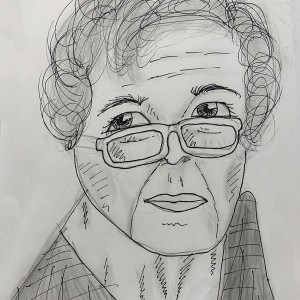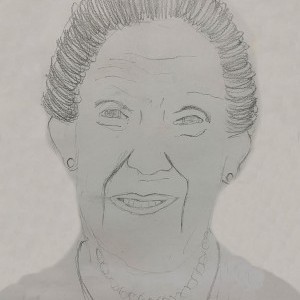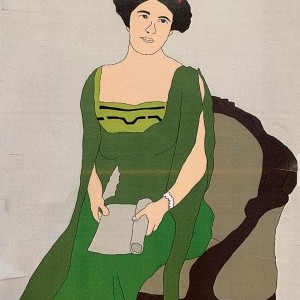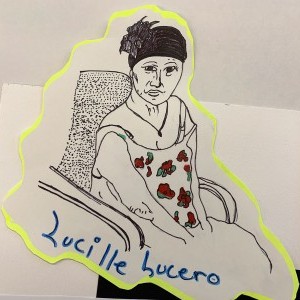Jose Ambriz
Kunsmiller Creative Arts Academy | Denver, CO | 11th Grade
Inspirational Family Member
Interviewing My Mom
I asked my mother if any other women in our family, in addition to her, voted. She did state aunts, but within our immediate family there really hasn’t been one. And since most of my family are from Mexico and never voted in the United States there is little information available to me on my family’s history. My mother immigrated with my dad to the US for better opportunities, they officially became citizens in 2015, and she was able to vote for the first time in 2016.
I asked her a few questions on that topic. She said that she voted in 2016 in state elections for the Governor of the state. It was a pleasant experience because she felt she could bring about change and that voting gave her a voice.
I went on to ask her hypothetical questions.
Q: If you were denied the right to vote how would you feel?
A: I would feel sad and insulted if I didn’t have the opportunity or right to vote, and as though I’m not part of the United States.
Q: If the women suffrage had not happen at all, how would you feel?
A: That would be terrible because I wouldn’t feel as important as a woman, and I think I would also feel disrespected for not having the right to vote.
Q: How do you feel being the first person in your family to vote?
A: It makes me feel proud of what I have accomplished and excited about what’s to come for me.
Historical Figure I Admire
Lida Gustava Heymann
The 19th Amendment stated that voting could not be restricted to citizens because of their sex. Because men already had the right to vote, it is understood that the 19th Amendment gives women the right to vote. This year marks the 100th anniversary of the Women’s Suffrage Movement, the movement that would give women the right to vote. So, let’s take a trip back to the past and meet one of the women who impacted the rights of all women.
Firstly, the woman we are shining a light on in this biographical essay is Lida Gustava Heymann. Ms. Gustava Heymann was a radical feminist and a pacifist that was active in Germany. She was part of the German Women’s Movement until 1933. Germany, during her life, saw the widespread militarization of society, and with the support of nationalism, Germany was not kind to the peace movement, and would have been part of mostly the minority. The introduction of compulsory military service in Prussia resulted in the radicalization of the ways in which the military became a primary necessity for the construction of masculinity, which excluded women to be a part of it.
Lida Gustava Heymann was affected by those events and, especially after the passing of her father, she developed into a strong, independent woman. She considered herself a feminist and decided to use the money of her inheritance to support a diverse range of humanitarian and philanthropic projects including the International Abolitionist Federation. The IAF was a union of progressive women, and in 1912 she belonged to the founding group of the Deutscher Verband für Frauenstimmrecht, DFV, also known as the German Union for Women’s Suffrage.
Later on, various issues started to appear for Ms. Gustava Heymann and the other activists mostly because only the Social Democratic Party of Germany (SPD) had advocated for universal women’s suffrage. Furthermore, by 1912 both the left and right wing groups could not work together due to strategic differences. As a result, Ms. Gustava Heymann decided to join her friends, especially working alongside Anita Augspurg, her co-activist and life until their unlikely deaths in 1943. Together with Augspurg, Minna Cauer and other fellow activists, they followed the model of the WSPU (a radical group under the leadership of Emmeline Pankhurst in England), and set up a German Union for Women’s Suffrage advocates. Later on, Ms. Gustava Heymann, along with her allies, made the Women’s Suffrage Movement international throughout Europe.
Finally, from those effects, the contributions Lida Gustava Heymann made, along with others, helped the women in Germany have the same rights as men including gaining their voting rights in 1918, while also helping to show that women were not just useful to society, but intelligent and motivated political figures. Even, Ms. Gustava Heymann noticed that she was a role model for generations to come noting that she believed that women need to become active in political parties and parliaments now that women finally gained universal suffrage in Germany.
What the Project Means to Me
Lida Gustava Heymann had a huge impact on the advancement of the rights of women, and her work and success, while not done in the United States, certainly were an inspiration to the American Women’s Suffrage Movement and helped lead to the passage of the 19th Amendment in the United States. Her contributions, no doubt advanced women’s suffrage throughout the world making it possible for every woman to have the right to vote.
Explore the Archive
More From This Class
Click on the thumbnails below to view each student's work.Deadline Extended
There's still time to join Women Leading the Way.
Become a part of our storytelling archive. Enroll your class today.
Join the Project

















